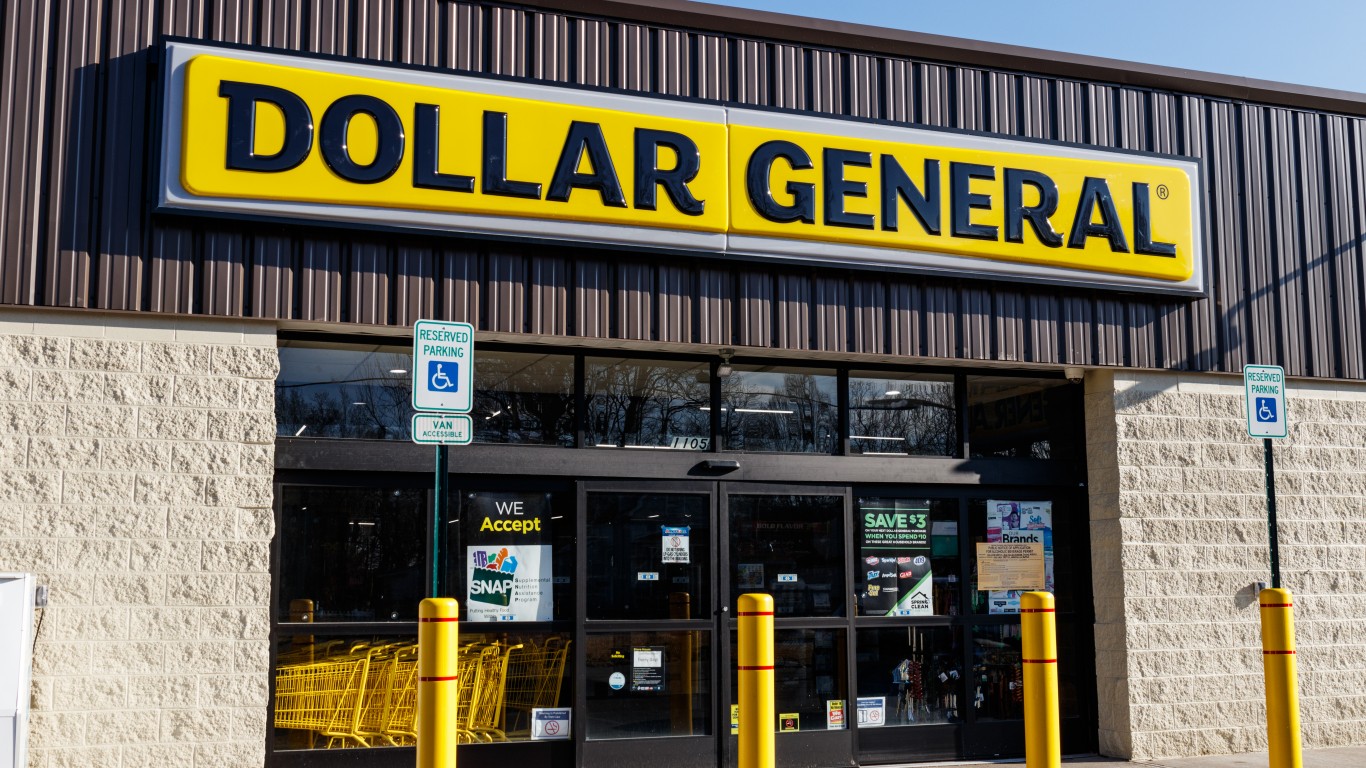
24/7 Wall Street Insights
- Real estate is a tried and true asset class for passive income wealth building, but the high entry price can eliminate those with limited liquid investment capital.
- REITs offer a prorated platform for smaller investors to participate in the real estate sector to enjoy the income streams it generates in the form of dividends, but without the liabilities of property management.
- For investors seeking dividends, click here for a free report on two high dividend stocks.
Throughout human history, the ownership of land and real estate property has been a universal source of wealth. Rich Dad, Poor Dad financial guru Robert Kiyosaki is a strong proponent of real estate investment as a key component of wealth building, even on a small scale.
REITs: A Smart Way To Get Into Real Estate

As investments in brick and mortar real estate have an often prohibitively high price of admission for small investors, Real Estate Investment Trusts (REIT) are worth one’s consideration. Traded as stocks, REITs are registered with the SEC and are required to remit 90% of profits to shareholders in return for access to the public capital markets. For individual investors, a REIT is a win/win: access to the attractive income generation derived from large portfolios of real estate properties with professional management without the inherent headaches and liabilities.
The REIT category is broad. Some REITs own and manage physical real estate properties. Others deal solely with the finance and mortgage aspects. Then there are some that only invest in real estate related bonds, collateralized mortgage obligations (CMO) backed by US government agencies like Fannie Mae and Freddie Mac, or riskier real estate related debt. There are also hybrids, commercial industry specialists (retail, office buildings, resorts, etc.), residential housing specialists, and additional niche market companies in the space.
A portfolio created from the following ten REIT examples would have a combined average APY of 13.8%. The $13,500 annual income figure is based on a $100,000 investment with $10,000 allocated to each REIT stock. Of course, the yield percentage would apply regardless if the principal investment amount scales up or down. Yields and prices are based on market quotes at the time of this writing.
Generation Income Properties

Stock # 1 : Generation Income Properties (NASDAQ: GIPR)
Yield: 23.76%
Shares for $10,000: 5,076
Annual Dividend Income: ~$2,376
Based in Tampa, FL, Generation Income Properties is a REIT that owns and manages commercial properties in a number of states, such as CA, VA, IL, TX, CO, AL, AZ, OH, GA, ME, PA, NC, and, of course, FL. Its business model is predicated on acquisition and ownership of large commercial properties for rentals to creditworthy retail and manufacturing tenants.
Commercial tenants include a number of well known entities, including Starbucks, Kohl’s, Walgreens, Sherwin-Williams, Dollar General, La Z Boy, and Pratt & Whitney Engines. Currently, the company’s properties are 100% occupied, 92% investment grade tenancy, 92% rent increases, 5.8x rent coverage.
Management considers the current price and abnormally high yield to be a temporary aberration. A merger deal in early 2024 with Modiv Industrial (NYSE: MDV) essentially doubled Generation Income Properties’ market cap, portfolio of properties, and net operating income. However, it also distributed free trading shares to MDV shareholders in what was received as a dividend. The subsequent profit-taking increased trading volume by 400%, but reduced the market price.
The Board recently approved of continuing the present monthly dividend payout amount and is anticipating commensurate profits from the larger asset base. Therefore, the current 23.76% yield will probably shrink as the stock price appreciates back to its pre-merger levels.
Orchid Island Capital

Stock #2 : Orchid Island Capital (NYSE: ORC)
Yield: 18.09%
Shares for $10,000: 1,256.28
Annual dividend income:~$1,809
Vero Beach, FL headquartered Orchid Island Capital, Inc. is a REIT that specializes in investments of Residential Mortgage Backed Securities (RMBS). Its $3.9 billion AUM portfolio includes single resident mortgages, collateralized mortgage obligations (CMO), mortgage pass-through certificates, as well as interest-only, principal-only, and other types of securities and mortgage related paper.
The top three (3) institutional shareholders in Orchid Island Capital stock as of July are: BlackRock Inc. (7.61% of total shares); Vanguard Group (4.14%); and Geode Capital Management (1.72%). Orchid Island Capital pays dividends monthly.
Ares Commercial Real Estate Corporation

Stock #3 : Ares Commercial Real Estate Corporation (NYSE: ACRE)
Yield: 14.81%
Shares for $10,000: 1,470.58
Annual Dividend Income: ~$1,481
Serving as the real estate arm of NY based global alternative investment management titan Ares Management (NYSE: ARES), ACRE has a $2.2 billion portfolio in US commercial and multi-family real estate loans. As of July, 99% of the 42 loan portfolio held senior mortgage loans with the remaining 1% in subordinated debt or preferred equity. Geographically, 33% were located in the Northeast, 24% in the Southeast, 19% in the Midwest, 12% in the Southwest, and 12% in the Pacific Coast. Industry breakdown is as follows:
- Office | 37%
- Multifamily | 26%
- Hotel | 5%
- Mixed-use | 6%
- Industrial | 12%
- Student Housing | 1%
- Self Storage | 4%
- Residential / Condominium | 9%
ARMOUR Residential REIT, Inc.

Stock #4 : Armour Residential REIT, Inc. (NYSE: ARR)
Yield: 14.42%
Shares for $10,000: ~ 500
Annual Dividend Income: ~$1,442
Also located in Vero Beach, FL, Armour Residential REIT, Inc. is a real estate investment trust that manages a portfolio of US agency backed mortgage securities from Freddie Mac, Fannie Mae, and Ginny Mae. While Armour Residential REIT, Inc. delivers a very high dividend, analysts previously did not see much fundamental reason as to why there would be any strong capital appreciation upside potential. However, Zack’s early August consensus estimate recently upped its earnings target for Armour Residential from 82 cents to 95 cents, with no analyst lowering its target. The dividend appears to be safe, but a price upside possibility is certainly an added plus for shareholders.
AGNC Investment Corp.

Stock #5 : AGNC Investment Corp. (NASDAQ: AGNC)
Yield: 14.40%
Shares for $10,000: 1,000
Annual dividend income: ~$1,440
REITs can focus on a range of sub-categories in the real estate realm that can generate hefty returns if managed in a strategic fashion. Based in Bethesda, MD, AGNC Investment Corp. invests almost exclusively in US Government Agency mortgage securities, such as Fannie Mae, Freddie Mac and Ginny Mae. However, it uses leverage via repurchase agreements and aggressively incorporates hedging strategies and derivatives to both protect portfolio assets as well as to enhance returns.
Since AGNC operates more as a financial portfolio management company than a hands-on property management one, it is more sensitive to interest rate swings than some other REIT peers. It has shifted this year into a more defensive position with significant hedge protection due to market volatility. The company prudently repositioned certain credit-focused holdings, trimmed its non-agency portfolio and increased exposure to higher-coupon holdings. These asset-selection efforts were taken to strategically offer greater stability of cash flows and set the stage for long-term growth.
During the first-half of 2024, AGNC’s interest rate hedge position covered 98% of the outstanding balance of its Investment Securities Repo, TBA position and other debt going into July, 2024. It pays its dividends monthly.
Brandywine Realty Trust

Stock #6 : Brandywine Realty Trust (NYSE: BDN)
Yield: 11.90%
Shares for $10,000: 1,996
Annual Dividend Income: ~$1,190
One of the largest publicly traded hands-on commercial and residential real estate management REITs in the US, Brandywine Realty Trust owns, develops, and leases over 24 million square feet of space. Brandywine Realty Trust’s $5 billion real estate portfolio is focused primarily in Austin, TX (23 properties), Washington, DC (33 properties), and Philadelphia, PA (103 properties), where Brandywine’s head office resides. Brandywine specializes in managing urban, town center, and transit-oriented properties.
Franklin BSP Realty Trust, Inc.

Stock #7 : Franklin BSP Realty Trust, Inc. (NYSE: FBRT)
Yield: 11.42%
Shares for $10,000: 801.28
Annual Dividend Income: ~$1,142
New York’s Franklin BSP Realty Trust, Inc. is a hybrid type of REIT that engages in direct origination of mortgages, ownership of brick and mortar properties (via foreclosure or direct purchase), as well as portfolio management of real estate related loans and other debt investments. Its criteria for first mortgage loans are as follows:
- $10-$250 million loan size
- Up to 80% Loan to Value
- Stabilized or transitional property
- 3-5 year term (transitional)
- 10 year term (stabilized)
- Any commercial property type
Institutional ownership interest in Franklin BSP Realty Trust is strong at 56.54%. Among the largest shareholders are asset management titan BlackRock, Inc. at 16.63%, Vanguard Group, Inc. at 10.87%, and State Street Corp., at 3.96%.
Angel Oak Mortgage REIT, Inc.

Stock #8 : Angel Oak Mortgage REIT, Inc. (NYSE: AOMR)
Yield: 10.79%
Shares for $10,000: 843.17
Annual Dividend Income: ~$1,079
Some REITs are set up to buy mortgage securities for their portfolios. Some create mortgages by doing the origination in-house. Angel Oak Mortgage REIT, Inc. acquires first lien mortgages and then securitizes them for sale to other REITs and institutions.
Based in Atlanta, GA, Angel Oak Mortgage REIT, Inc. gets its high-quality mortgage loans from various Angel Oak companies. The securitization of the mortgages enables Angel Oak Mortgage REIT to use term structural leverage instead of mark-to-market leverage. The REIT subsequently retains 5-10% market value of the new securities, of which the interest-only and subordinated tranches generate additional revenues without leverage. The proceeds are then used to purchase additional high-quality mortgages, and the cycle repeats.
The anticipated Federal Reserve rate cuts should benefit Angel Oak Mortgage REIT. During Q1 2024, the company reported $0.51 net income. It was only liable for $0.11 of distributable earnings during the same timeframe, yet, it paid a dividend of $0.32 for that quarter. Angel Oak Mortgage’s non-traditional mortgage business allows it to perform well in a higher interest rate environment. Taking on higher risk mortgages including non-qualified mortgages and others designed for borrowers with unique financial situations has proven to be a lucrative niche. Therefore, Angel Oak Mortgage earnings should improve when lending costs fall and risks are reduced.
Global Medical REIT Inc.

Stock #9 : Global Medical REIT Inc. (NYSE: GMRE)
Yield: 9.33%
Shares for $10,000: 1,107.42
Annual Dividend Amount: ~$933.00
Global Medical REIT Inc. owns and manages commercial real estate property that specifically leases to tenants in the medical and healthcare fields. From its Bethesda, MD headquarters, Global Medical REIT Inc. manages 391 leases across 184 buildings, as of July.
At the end of the Q2 2024, the GMRE portfolio consisted of $1.4 billion in real estate properties and included $4.7 million of total leasable square feet, 96.4% occupancy, 5.8 years of weighted average lease term, 4.8 times rent coverage, with 2.2% weighted average contractual rent escalations. The company recently acquired a 15 property portfolio of outpatient medical real estate, fully occupied and triple net lease, for $81 million.
Redwood Trust, Inc.

Stock #10 : Redwood Trust, Inc. (NYSE: RWT)
Yield: 9.14%
Shares for $10,000: ~1,414.42
Annual Dividend Income: ~$914.00
Based in Mill Valley, CA, Redwood Trust, Inc. is a REIT that is involved with multiple segments on the financial side of real estate. Redwood Trust separates its myriad operations into various divisions:
- Residential Consumer Mortgage: this segment deals with third party acquisition of individual residential mortgages, mortgage-backed securities, and mortgage related debt. Redwood Trust management then determines whether to add them to its in-house portfolio, resell them, or bundle them for securitization purposes. In addition to securitization, the Residential Consumer Mortgage division also creates financial derivative instruments as a risk management hedge.
- CoreVest – Residential Investor: this segment originates loans on residential properties. The loans can take the form of long-term mortgages, shorter term bridge loans, construction loans, or revolving credit lines. These loans will be added to the in-house portfolio, resold, or securitized at management’s discretion.
- Investment Portfolio: this division manages the portfolio of cumulative mortgages, mortgage-backed securities, and mortgage-related debt, both originated by CoreVest or acquired by the Residential Consumer Mortgage segments.
- RWT Horizons: created as a venture capital entity specializing in financial and real estate technology at the seed capital and early development stages, RWT Horizons initiates strategic partnerships with those cutting-edge companies whose products and/or technologies will contribute to better efficiencies and strategic advantages for Redwood Trust.
- Aspire: created a real estate investment platform as opposed to a loan program, Aspire provides home equity upfront cash to homeowners in exchange for the future value of the appreciated percentage stake in the property.
80% of Redwood’s portfolio of loans are created in-house, with only 20% obtained from third parties. Single Family bridge loans and multifamily bridge loans comprise over half of Redwood Trust’s underwritings.
The Real Estate sector has slowed as a result of the Federal Reserve’s interest rate hikes and their impact on mortgage rates. The anticipated rate cuts in September are expected to give the market an eagerly desired boost, which should benefit these and other REITs towards the latter part of 2024.
| Name: | Yield: | Annual Dividend Income: |
| Generation Income Properties (NASDAQ: GIPR) | 23.76% | ~$2,376 |
| Orchid Island Capital (NYSE: ORC) | 18.09% | ~$1,809 |
| Ares Commercial Real Estate Corporation (NYSE: ACRE) | 14.81% | ~$1,481 |
| Armour Residential REIT, Inc. (NYSE: ARR) | 14.42% | ~$1,442 |
| AGNC Investment Corp. (NASDAQ: AGNC) | 14.40% | ~$1,440 |
| Brandywine Realty Trust (NYSE: BDN) | 11.90% | ~$1,190 |
| Franklin BSP Realty Trust, Inc. (NYSE: FBRT) | 11.42% | ~$1,142 |
| Angel Oak Mortgage REIT, Inc. (NYSE: AOMR) | 10.79% | ~$1,079 |
| Global Medical REIT Inc. (NYSE: GMRE) | 9.33% | ~$933.00 |
| Redwood Trust, Inc. (NYSE: RWT) | 9.14% | ~$914.00 |
| TOTAL: | $13,806 |
It’s Your Money, Your Future—Own It (sponsor)
Retirement can be daunting, but it doesn’t need to be.
Imagine having an expert in your corner to help you with your financial goals. Someone to help you determine if you’re ahead, behind, or right on track. With SmartAsset, that’s not just a dream—it’s reality. This free tool connects you with pre-screened financial advisors who work in your best interests. It’s quick, it’s easy, so take the leap today and start planning smarter!
Don’t waste another minute; get started right here and help your retirement dreams become a retirement reality.
Thank you for reading! Have some feedback for us?
Contact the 24/7 Wall St. editorial team.





